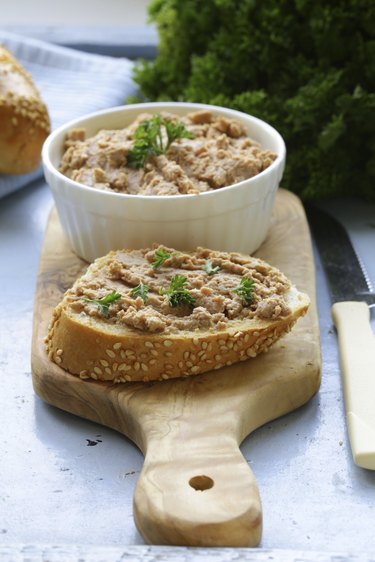
Made from a mixture of liver, fat and seasoning, pâté works well as a snack or dinner party hors d'oeuvre, served with crackers and crudités. Because it has a relatively small serving size but high calorie count -- 90 calories per ounce -- pâté is easy to overeat, so monitor your portion size when snacking. Adding pâté to your diet boosts your micronutrient intake, which offers some health benefits, but it also increases your intake of fat and cholesterol. Consume pâté in moderation as a treat, but don't make it a daily part of your diet.
Iron and Copper
Video of the Day
Pâté offers some health benefits as a result of its copper and iron content. The copper from your diet activates a family of enzymes, called cuproenzymes, that are essential to good health. Some cuproenzymes help your brain cells communicate effectively, while others help you make proteins required for strong tissue. A 1-ounce serving of pâté contains 113 micrograms of copper, or 13 percent of the recommended daily intake. The iron in pâté also makes up a component of enzymes, including enzymes required to make energy. Iron also activates a pair of proteins, called hemoglobin and myoglobin, that help your body transport and store oxygen. A serving of pâté boasts 1.5 milligrams of iron -- 8 percent and 19 percent, respectively, of the daily iron intakes set for women and men.
Video of the Day
Selenium and Riboflavin
Snack on pâté and you'll consume more selenium, as well as riboflavin, also called vitamin B-2. Riboflavin plays a key role in metabolic function, and it's required to break nutrients down into energy. Selenium activates proteins that regulate immune function, contribute to sperm development and support thyroid function. A serving of pâté offers 0.17 milligram of riboflavin, which is 13 percent of the recommended daily intake for men and 15 percent for women, as well as 11.8 micrograms of selenium, or 21 percent of your daily requirement.
Vitamins A and B-12
Eating pâté also benefits your health by increasing your vitamin A intake, as well as your consumption of vitamin B-12. Vitamin A contributes to the health of your immune system by guiding the growth of new white blood cells, as well as controlling mature white blood cell function. Vitamin B-12 is essential for the development of new red blood cells, and it supports nervous system health; a B-12 deficiency can cause irreparable nerve damage. A 1-ounce portion of pâté provides 936 international units of vitamin A, which contributes 40 percent toward the recommended daily intake for women and 31 percent for men. Each serving also contains 0.91 microgram of vitamin B-12, which is 38 percent of the recommended daily intake.
Nutritional Disadvantages
Although pâté boosts your mineral and vitamin intake, you should consume it in moderation because it's high in fat and moderately high in cholesterol. Each ounce of pâté contains 8 grams of total fat, which includes 2.7 grams of saturated fatty acids. In a 2,000-calorie diet, this makes up 12 percent of your daily saturated fat limit, or 17 percent if you have high cholesterol or heart disease. Saturated fat has a significant effect on your blood cholesterol, negatively affecting your cholesterol levels and contributing to cardiovascular disease. An ounce of pâté also contains 72 milligrams of cholesterol, which is a considerable amount toward the 300-milligram maximum set for the general public, or the 200-milligram limit for those with heart disease or high cholesterol. While not as harmful as saturated fat, cholesterol can still increase your blood cholesterol levels and threaten your cardiovascular health.